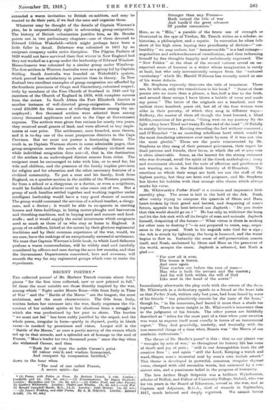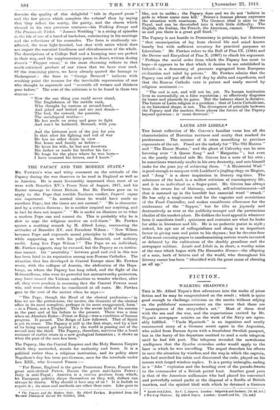RECENT POETRY.*
THE collected poems' of Mr. Herbert Trench contain about forty pieces "for the first time collected, new or now printed in full." Of these the most notable are those directly inspired by the war, among which "Night under Monte Rosa—Ode from Italy in Time of War" and the "Battle of the Marne" are the longest, the most ambitious, and the most characteristic. The Ode from Italy, written before her entrance into the war, finely expresses the dis- content of her noblest spirits at her aloofness from a struggle in which she was predestined by her past to share. The burden "we must not fail" has been nobly justified by the sequel, and the whole poem, irregular in form—partly in rhymed, partly in blank verse—is marked by prescience and vision. Longer still is the "Battle of the Marne," at once a poetic survey of the events which led up to that miracle, and a splendid act of homage to the soul of France, "Man's leader for two thousand years" since the day when she withstood Caesar, and then
"Took for all time the noble Caesar's print Of valour rein'd, and wisdom humanized, And conquest by compassion fortified," down to the hour when "The soul of one called France, A secret spirit—far
• (1) Poems. with Pablo in Prose. By Herbert Trench. 2 vols. London .: fonstabte and Co. 1108. ed. net.]—(2) Reinearnaticnur. By James Stephens. London : Macmillan and Co. (3s. ed. net.)---(3) Father Noah, and other Fancies. By Geoffrey Whitworth. London; Chatto and WIndus. [2s, ed. net]-_--(4) War By Ronald Compbeli.Maetie, M.D., LL.D. London: John Murray. [3s. ed. net.J —(5) Jones's Wedding. and other Poems, By A. H. Sidgwick. London: Edward Arnold. f3s. ed. net.] Stronger than any France- Hath turned the tide of war And baulk'd the great advance Of yonder cannoniers."
Here, as in "Milo," a parable of the brute use of strength as illustrated in the epics of Verdun, Mr. Trench writes as a scholar, an historian, a philosopher, and a mystic. In execution he often falls short of his high aims, lapsing into grandiosity of diction—" urn- bratility " we may endure, but " immarcescible " is a bad coinage— angularities and awkwardnesses of versification, and than redeeming himself by fine thoughts happily and melodiously expressed. The "New Fables" at the close of the second volume reveal an un- expected sense of humour in a writer whose imagination is rarely at fault, but who only intermittently escapes from the "tortured vocabulary" which Mr. Harold Williams has recently noted as one of his worst defects.
Mr. Stephens expressly disavows the title of translator. There are, he tells us, only two translations in his book.2 "Some of these poems owe no more than a phrase, a line, half a line to the Irish, and around these scraps I have blown a bubble of verse and made my poem." The latest of the originals are a hundred, and the earliest three hundred, years old, but all of the four writers were alike in their poverty, of which they sang in different ways— Rafferty, the master of them all though the least learned, a blind fiddler, conscious of his genius, "Going west on my journey By the light of my heart Tired and weary To the end of the road " ; O'Rahilly in stately bitterness ; Keating recording the fact without comment ; and O'Bruadair "in an unending rebellious bawl which would be the most desolating utterance ever made hymen if it was not also the most gleeful." These are the poets reincarnated by Mr. Stephens as they sang of their personal grievaneee, their regret for dead patrons and friends, their loves, in which the odi at anio vein is often observable. Some, as the lament for the strong swimmer who was drowned, recall the spirit of the Greek anthologists ; irony and resentment abound, but the note of affection and gentleness is not wanting save in the freakish ferocity of O'Bruadair. The emotions on whieh their songs are built are not the stuff of the highest poetry, but they are keen and poignant, and Mr. Stephens has blown his bubbles with that strange elfin charm which alwaye marks his verse.
Mr. Whitworth's Father Noaha is a curious and impressive little morality play. The scene is laid in the hold of the Ark. Noah, after vainly trying to compose the quarrels of Shem and Ham, heart-broken by their greed and hatred, and despairing of man's future, appeals to his best-beloved son Japheth "Do you desire that this world should go on?" He has only to withdraw the bung and let the Ark sink with all its freight of man and animals. Japheth himself, despairing of the future—" What virtue is there in making for other men to destroy ? "—is not prepared to resist, nay, acqui- esces in the proposal. Noah in his anguish asks God for a sign ; the Ark is struck by lightning, the bung is loosened, and the water begins to flow in. Instantly the sense of self-preservation asserts itself, and Noah, acclaimed by Shem and Ham as the preserver of the world, accepts the omen. Japheth is ashamed, but Noah is glad :—
" For now all is over, The lesson is learnt, And once again
Time reaches out before the race of man—
Man who is both the servant and the master ; And his will lieth within the will of God Like seed in the hand of the sower."
Immediately afterwards the play ends with the return of the dove. Mr. Whitworth in a dedicatory epistle to a friend at the front tells us that Father Noah, written only last year, had been found by some of his friends "too primitkeely remote for the taste of the hour," though he, "in his innocence, had feared it more than a shade too topical." There is more insight in Mr. Whitworth's innocence than in the judgment of his friends. The other poems are faithfully described as "relics for the most part of a time when your emotion was wont to express itself most vocally in terms of an immemorial regret." They deal gracefully, tenderly, and ironically with the non-essential things of a time when Russia was "the Mecca of ow
aesthetic enthusiasm."
The theme of Dr. Macfie's poem* is this; that as our planet was "wrought by arts of war," so throughout its history life has come of death and joy of pain ; "still in our Armageddon burn the old creative fires " ; and again "still the Lord, Keeping a watch and ward, Shapes man's immortal soul by man's own foolish sword." This theme is developed in powerful, sonorous, irregular rhymed verse, charged with odd reoondite words, but animated by a con- sistent aim, and a passionate belief in the progress of humanity.
The late Arthur Hugh Sidgwick was a brilliant Wykehamist, scholar of Balliol, and Fellow of University College, Oxford, who was for ten years in the Board of Education, served in the war, and as Captain and Adjutant, R.G.A., died of wounds in September, 1017, much beloved and deeply regretted. We cannot better describe the quality of this delightful "tale in rhymed prose" and the few pieces which complete tho volume5 than by saying that they reflect the sanity, the gaiety, and the charm which abound in his two previous ventures—his Walking Essays and The Promenade Ticket. " Jones's Wedding" is a string of episodes in the life of one of a band of bachelors, culminating in his marriage and the reflections of his comrades. The form is studiously un- affected, the tone light-hearted, but shot with satire which does not impair the essential kindliness and chivalrousness of the whole. The descriptions of a College Ball and a bumping race are perfect in their way, and the supplementary poem to Janet, written during Jones's "Flapper craze," is the most charming tribute to that much-criticized product of our times that we have ever read. Of the remaining pieces, we have already quoted the homage to Shakespeare : the lines to "George Bernard" indicate with crushing point the reasons for the inevitable supersession of one who thought to supersede and "override all writers and thinkers gone before." The core of the criticism is to be found in these two stanzas
Now the one thing you could never stand, The Englishman of the middle rank, Who thought by custom at second-hand, And joked and betted and ate and drank— The fool, the coward, the parasite,
The sociological residue— He has made an army and gone to fight
And can't be bothered, Bernard, with you.
And the bitterest part of the jest for you Is that after his fighting and toil of war He has no other desire in view
But home and family as before— He loves his wife, he has not forsworn His father or made his brother his foe : He longs for the place where he was born—
have censored his letters, and I know."



































 Previous page
Previous page